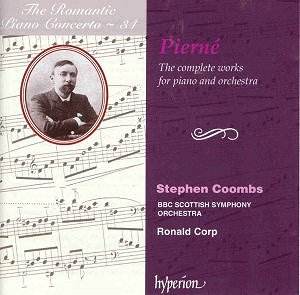Stephen Coombs magnificently conquers the knuckle-cracking
challenges of these fascinating works. They are by no means the
insubstantial glitter-merchandise I had expected. True, some of
their charm is in their surface dazzle, but there is sentiment
here as well.
The Pierné Piano Concerto belongs
amongst the glitterati of piano concertos: the five by Palmgren
and the five by Saint-Saëns being like-hearted works. Its
three movements encompass moods from that of the middle movement
of the Tchaikovsky First to a petulant Mephistophelian aggression
(as in Totentanz). Think also in terms of the Haydn Wood
Piano Concerto, the Holbrooke First Concerto Gwyn-ap-Nudd
and the magnificently galloping Saint-Saëns Second Concerto.
It stops just short of the romanticism of the Rachmaninov Second
Concerto.
After the brocade and brilliance of the Concerto
the Poëme Symphonique represents a noticeable
gear-change. It stands clear of the merely decorative, being pensive,
dream-like and complex in its moods. It draws on the sort of intensity
to be found in Bax's Symphonic Variations and Winter
Legends (10.19) with an evolution towards sturdy victory in
the closing pages. Some nice trumpet playing is to be found in
the finale. The work was dedicated to Maria Roger-Miclos who later
became the dedicatee of Saint-Saëns' Africa.
Fantaisie-Ballet was Pierné's
first work for piano and orchestra. Its dedicatee is the pianist,
Caroline Montigny-Rémaury, the sister-in-law of Ambroise
Thomas and a friend of Saint-Saëns (she was the dedicatee
of Saint-Saëns Wedding Cake Caprice). The work is
alive with inventive and pert display and the episodes at 7.10-8.03
(Russian) and 10.10 (Gershwin!) illustrate its vitality.
The Scherzo-Caprice is back to
Saint-Saëns territory with the waltz a clear presence. One
can see how small a step it was from here to the irresistible
sentimentality of Poulenc's Piano Concerto and to Ravel's La
Valse.
The performances are not found wanting in any
respect. You might bemoan that the BBC Scottish is not the
Philadelphia but short of issues about lushness of string tone
the sound of the orchestra is fully satisfying.
Stephen Coombs contributes a wide-rangingly informative
booklet note reflecting his immersion in the repertoire. I have
shamelessly poached from it.
This disc has all the high end attributes of
Hyperion's reputation: tireless in its production and exemplary
approach.
Rob Barnett
